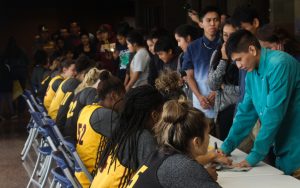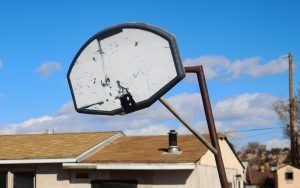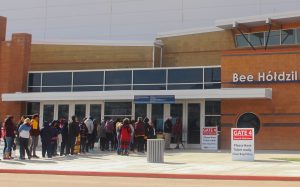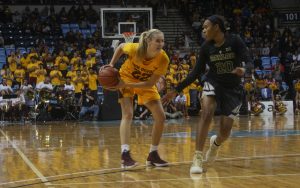- Slug: Sports-ASU Rez Ball, 1,681 words
- Photos available
By SAM FICARRO
Cronkite News
FORT DEFIANCE – For many on the Navajo Reservation, basketball means everything.
The houses in this small northeast Arizona community on the New Mexico border feature a diversity of basketball hoops. White. Black. Gray. Some have rims with no net, others have rims with only part of a net hanging from them. Many are attached above garages, like anywhere else in the country. Some simply protrude from the top of a black metal bar.
All are well-worn. They are symbols of hope for the Navajo people.
“I was told if there’s a basketball hoop, you can just basically play anywhere, and that’s how it is on the Rez,” said Payton Charley, a junior on the girls team at Window Rock High School. “There’s dirt, they still play. If it’s like really muddy, and it’s uneven, they still play. We just have so much love for the game here.”
The Arizona State women’s basketball team saw that firsthand when the team traveled to Fort Defiance recently to play a game on the Navajo Reservation against Baylor. The goal was to honor Native American culture and recognize the tribe’s Vietnam Veterans.
But the Sun Devils also came away with a greater knowledge of the strong relationship between their sport and the Navajo community. It was a beneficial visit for both sides.
“I think this has been a really amazing educational experience for them because we have some kids who have Native American blood, of course. But not anybody that’s full Native and knows their clan or tribe, none who grew up on a reservation,” ASU coach Charli Turner Thorne said. “This is about learning everything they’ve had a chance to learn about, both the serious issues of reservation life and also the things to celebrate.”
The Navajo Reservation consists of many clans, but they all share a love and passion for the game of basketball. Rez ball, as they call it.
The run-and-gun, fast-pace style of play is popular with fans. A slow, possession-style of basketball doesn’t exist on the reservation.
Charley was one of many Navajo kids awestruck to see one of the state’s major college programs playing in their community.
“It inspires me,” Charley said. “The school is kind of small, and to have ASU here, it inspires me to go bigger, dream bigger and to have that mindset that wherever you live, you can always achieve more than you think.”
The love for basketball runs deep on the Rez.
And young native players need only look at their own history for the kind of inspiration Charley mentioned. Ryneldi Becenti, who was in attendance at the “Showdown on the Rez” game, played at Window Rock High and went on to play at Arizona State and to become the first native player in WNBA history.
“Being on the court makes me happy, even if it’s just playing around or taking it seriously,” said Charley, who added that basketball connects her and others to their community.
Dangelo Cadman, who has played for five years and is on the team at his community college, said the game is “just really fun – something to get the mind off stuff whether I’m feeling down or something.”
Despite wearing an Arizona Wildcats shirt, Cadman said he was pulling for ASU.
The game’s magnitude
After a 90-minute practice with spectators looking on, the Sun Devils went up to the main concourse of the Bee Holdzil Fighting Scouts Events Center, the school’s gym, and began signing posters.
The autograph session was only supposed to last about 30 minutes, but due to several thousand people lined up to meet the Sun Devils, the team stayed for 45 minutes. At the end of the table, two stacks of posters disappeared as fans made their way through the line.
Before walking through the autograph session, Charley pondered what she was going to say to the players.
“I’m going to ask what it took for them to make it all the way to college ball and how they succeeded,” she said.
Following the autograph session, Arizona State went back into the locker room where Peterson Zah, former chairman and president of the Navajo Nation, spoke to the team about the event and the history of the Navajo people.
“I don’t think you have a good idea as to the impact you’re going to have on our kids because they never saw a game, many of them, as close as they’ll be seeing you play,” Zah told the Sun Devils. “Many of them will watch on television a game of basketball, but … it’s a different experience to actually see people on their own land and their own gymnasium.”
Zah thanked Turner Thorne for her willingness to take a home game to Navajo land.
“We are very grateful to the great coach,” Zah said. “It’s one of those things where a person really understands on a larger scale what we’re all about. People who are that way (are) really hard to find. And then at the same time, they’re into their profession 100 percent. For me, that coach here represents that train of thought.”
Zah, an Arizona State women’s basketball season-ticket holder, told the team that he makes the 600-mile round trip to go to home games in Tempe, traveling to the Valley on game day and returning the day after.
“I want to thank the coach and the school for doing what you’re doing here because we all can not accurately predict what all this means,” Zah said. “It means a lot to the 80,000 Navajo kids who are school-aged. I want to thank you for agreeing to come. Enjoy the game, make it a lot of fun, and just play hard.”
ASU senior Kianna Ibis and freshman Jamie Loera left with lasting impressions of Zah’s speech.
“Just like what we heard in the story today (Saturday) in the locker room, like just being a better person,” Ibis said. “Being as young as I am and as young as our teammates are, just trying to stress the importance of inclusion, loving everybody and stuff like that. I think it really had an impact on all of us.”
“What their president told us today was, after this game, they’re just going to be impacted completely and they’re just going to try new things and go all out after this experience,” Loera said. “So I think it’s super cool to have this opportunity.”
Ibis was moved after seeing the names of fallen soldiers at the Window Rock Tribal Park and Veteran’s Memorial, especially significant with the game being played on Veterans Day.
“Just looking at those names and just hearing the stories that we’ve heard today and weeks before this, it just really puts a perspective and different outlook on things,” Ibis said. “Learning about their history I’m like, ‘Wow.’ I don’t think a lot of people really know (the history of Native Americans). Just hearing about it, you want better for everybody.”
Impact on youth
Ibis and Loera grew up in small towns – Ibis was born in South Dakota with Loera from Moses Lake, Washington — and both appreciate the impact the game can have on this community.
“It just makes me happy seeing that I can inspire younger girls and be a good influence for them,” Ibis said. “It just makes me really happy when I see them all excited after I give them a hug or I take a picture with them. Everyone is really awesome.”
“Where I’m from, a small community, you’re going to impact so many kids that are coming into this community. It’s like, ‘Wow, there are a lot of kids that you’re really going to impact,’ ” Loera said. “Having this opportunity is just amazing, especially being a collegiate athlete. They’re going to look up to us.”
Many on the Navajo Reservation might not realize the opportunity that sports can provide as an avenue to an education.
“I would tell them, ‘It’s OK if you don’t think you can do it but go for it.’ The opportunities are there. That’s why we’re here,” Turner Thorne said of pursuing a career in college basketball. “We want to show them, ‘Oh wow, you did this.’ Out here, they don’t see. ‘Oh wait, there are opportunities. I can get academic money to go to college. I can work on my sport and get an opportunity.’ I hope we can show them that the opportunities are there.”
Ibis believes in pursuing dreams.
“I feel you should never hesitate for anything you want,” Ibis said. “If you dream it, you can do it. When my Mom moved me to Omaha, Nebraska, I never thought that I would ever be playing college, especially D-I basketball. I think just keep on working every day, improving, meeting people, exploring opportunities and taking them while you have them. Basically, just go for it.”
Lasting impact
Squaring off against the No. 4 team in the country, Arizona State fought toe-to-toe with Baylor, leading by as many as 14 points in the second quarter and by 11 at halftime.
The Lady Bears, however, persevered in the second half, outscoring the Sun Devils 41-24 to win the game, 65-59 in front of 5,609 fans.
It was not the result ASU hoped for, but it won’t diminish the impact the game will have on the community.
The Navajo word “Yéego” was printed on the back of ASU’s warm-up shirts. It means “with much effort” and Turner Thorne said the Sun Devils lived up to the word with their performance, despite the loss.
“I think we won with the event,” Turner Thorne said. “I think no matter if we won or lost (the game), we wanted to show ‘Yéego.’
“We always talk about who we are over what we do. I think our players have great character on the floor. The character we play with — who we are — I thought that shined through. That’s going to inspire 80,000 Navajo kids on the reservation even more than if we win. I think they honored that, and did a good job.”
For more stories from Cronkite News, visit cronkitenews.azpbs.org.



